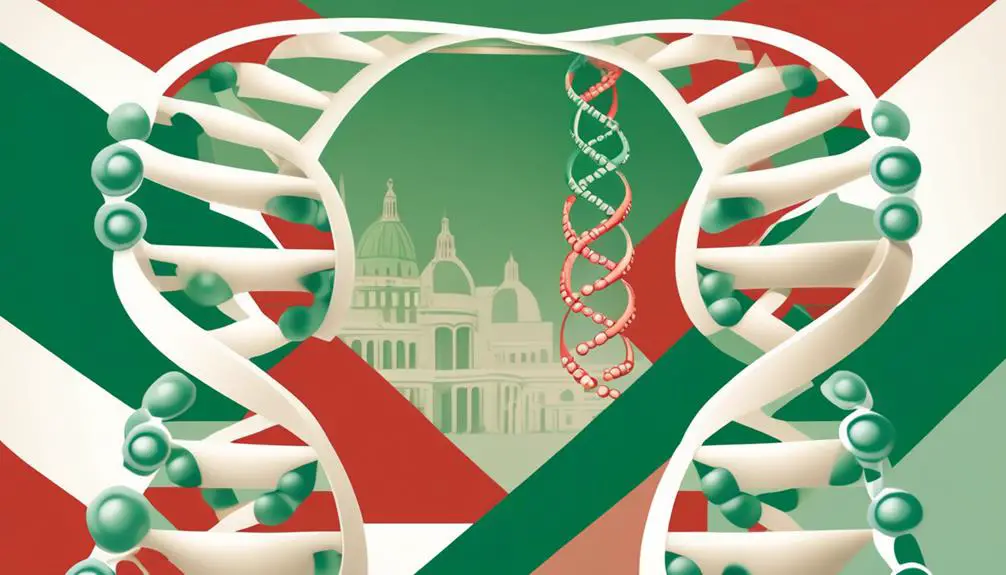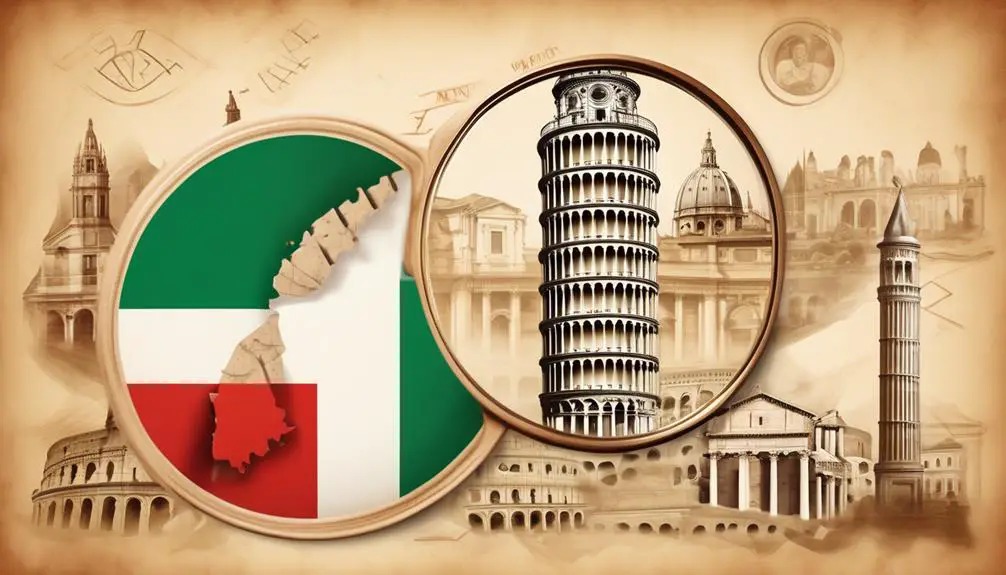Growing up, I was deeply connected to my Italian heritage, feeling a strong bond to the stories of our family’s ancestral village in Sicily that moved me deeply.
In my experience as a genetic genealogist, I've come to understand the power of DNA tests in unraveling our past. I believe they are a bridge to our heritage, a key to unlock stories woven into our DNA.
When I finally took the test, the results were a mosaic of my history, confirming whispers of noble blood and humble peasants alike.
It was more than a scientific revelation; it was a homecoming to my own lineage's narrative.
Key Takeaways
- DNA testing can reveal familial connections and trace ethnic roots, including Italian ancestry.
- Different DNA testing providers may yield varying results in terms of percentages and locations of Italian roots.
- Some providers, such as Ancestry, offer extensive relative-matching potential, while others like 23andMe provide unique insights into ancestry.
- Family Tree DNA excels in deep ancestral analysis through Y-DNA and MTDNA, which can be beneficial for tracing back to distinct Italian locales.
Understanding DNA Testing
DNA testing can illuminate your familial past, revealing connections to potential relatives and tracing your ethnic roots, but results may differ among various providers.
When you embark on a journey to uncover your Italian heritage through genetic testing, you're tapping into a complex web of databases and algorithms. Each company, like Ancestry DNA, has its own method for piecing together your genetic tapestry. Because of this, the picture of your ancestry may vary from one test to another.
It's crucial to remember that these cultural origin interpretations aren't absolute; they're based on educated guesses. Your personal genealogical research might tell a story that's slightly different from what the DNA tests suggest.
In the end, your Italian roots are woven from both your genetic makeup and your unique family history.
Top DNA Tests Reviewed
Exploring your Italian heritage, you'll find that companies like Ancestry, 23andMe, and Family Tree DNA offer unique insights, though their results for your ethnic makeup may vary.
Ancestry, with the largest database of 15 million people, might be considered the best DNA test for Italian ancestry by sheer numbers, offering extensive relative-matching potential. However, its oversimplification, particularly for southern Italians, can skew DNA test results.
On the other hand, 23andMe and Family Tree DNA might yield different percentages and locations of your Italian roots, underlining the intricacies of pinpointing precise ancestry.
Each test has the potential to reveal unexpected connections, adding layers to your understanding of your Italian lineage. Choose wisely to uncover the most accurate reflection of your familial past.
Analyzing Italian Genetic Markers

While different tests offer varying insights into your Italian roots, understanding Italian genetic markers is key to a more precise ancestry profile. These markers are specific genetic signatures that highlight your connection to Italian DNA.
With companies like LivingDNA, you can delve into regional breakdowns, uncovering not just if you're Italian, but which part of Italy your ancestors hailed from.
FamilyTreeDNA excels in deep ancestral analysis through Y-DNA and MTDNA, offering a powerful look at your paternal and maternal lineages. However, remember that DNA testing for location accuracy can be inconsistent.
MyHeritageDNA stands out by closely matching genealogical research, ensuring that your Italian heritage isn't just a statistical estimate but a reflection of your true lineage.
Interpreting Regional Ancestry Results
When you receive your Italian ancestry results, it's crucial to understand how to interpret the regional information they provide. Companies like LivingDNA may offer a detailed ethnicity breakdown, pinpointing specific regions where your Italian ancestors hailed from. This can give you a richer picture of your heritage, potentially connecting you with areas like Sicily, Lombardy, or Tuscany.
However, remember that DNA testing for location accuracy can be inconsistent. Different providers may yield varying results regarding the percentage of your Italian heritage and its regional distribution. FamilyTreeDNA, for example, excels in Y-DNA and MTDNA analysis, which can offer deeper insights into your paternal and maternal lines, possibly tracing back to distinct Italian locales.
Always consider these variations when examining your regional ancestry results.
Maximizing Your DNA Discoveries

Understanding the regional aspects of your Italian heritage is just the first step. Now let's focus on how you can enhance the search for your genetic connections.
Upload your DNA data to multiple platforms that allow you to upload such information. By doing this, you're not just sticking with Ancestry's extensive but singular database. With its user base nearly doubling each year, your chances of discovering new relatives grow too.
Explore 23andMe and Family Tree DNA to tap into their unique features. Don't stop there; platforms like MyHeritage, GEDmatch, MyLivingDNA, and Geneanet broaden your search and can connect you with living relatives in Italy.
Frequently Asked Questions
Can a DNA Test Tell if You Are Italian?
Yes, a DNA test can indicate if you're Italian by analyzing genetic markers, but consider regional variability that affects ancestry accuracy. Your results may show varying degrees of Italian heritage.
What Is the Closest DNA to the Italians?
You're seeking the closest DNA to Italians, which involves genetic markers, population genetics, and migration patterns that reflect the historical movements and mixtures of peoples across the Mediterranean and Europe.
How Do I Find Out if I Have Italian Ancestry?
To discover if you've got Italian roots, start by digging into family records, examine cultural traits, and research historical migration patterns that may link your lineage to Italy.
Is Ancestrydna Available in Italy?
Yes, you can access AncestryDNA in Italy, ensuring test accuracy with secure sample handling and privacy measures to protect your information while you explore your roots.
Conclusion
Now you're equipped with the know-how to choose a DNA test that can unveil your Italian roots.
Go ahead, pick from the top contenders, and dive into those Italian genetic markers.
Your regional ancestry results await to tell a story only you can fully appreciate.
Remember, to cast a wider net, upload your data across platforms.
You're on the brink of connecting with relatives and enriching your understanding of your Italian heritage.
Embrace the journey!

Throughout his career, Andras Kovacs has developed a deep understanding of DNA and its applications in genealogy and genetic testing. He has helped thousands of individuals uncover their ancestral heritage, using cutting-edge DNA analysis to trace family lineages and reveal connections across generations.

